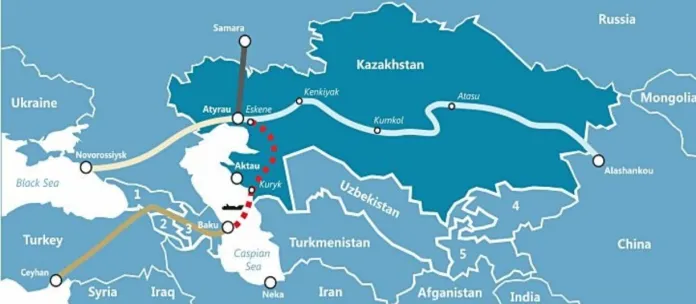
Bridging East & West, Russia’s Buddy Kazakhstan key player to boost Global Trade via ‘Middle Corridor’
The European Union and Kazakhstan have been partners since the implosion of the Soviet Union in 1991. The two sides signed an Enhancement Partnership and Cooperation Agreement (EPCA) in 2015, which cemented their bilateral relations.
The agreement enables Kazakhstan to receive financial and technical assistance from the EU through the European Instrument for Democracy and Human Rights (EIDHR), the Instrument contributing to Stability and Peace (IcSP), the Nuclear Safety Instrument, the Partnership Instrument, and education support and exchange through the ERASMUS + Programme.
In 2023, the EU and Kazakhstan signed a bilateral financing agreement of about 9 million Euros to support the implementation of the EU-Kazakhstan Enhanced Partnership and Cooperation Agreement.
Trans-Caspian International Transport Route
The B&R Initiative (BRI) of China, aimed at enhancing trade between Asia and Europe, was announced by President Xi Jinping of China during one of his visits to Kazakhstan. It is considered a landmark in opening new vistas of trade and connectivity in the vast Eurasian region.
However, global trade had to face several challenges. Last year, the overall trend showed a slowdown compared to the robust growth of 2022. Trade in goods, in particular, was down sharply last year.
As disruptions send shipping costs surging and trade volumes slow, the overland Trans-Caspian International Transport Route offers a cheaper and more sustainable option.
On 12 June, the European Commission and Kazakhstan launched the Coordination Platform for the Trans-Caspian Transport Corridor, also known as the Trans-Caspian International Transport Route (TITR) or the Middle Corridor, in Astana.
According to Kazakhstan’s Ministry of Transport, the newly established Coordination Platform will improve the safety and sustainability of the Trans-Caspian Transport Corridor and turn it into a multimodal and competitive route linking Europe and Asia in 15 days or less.
Representatives of Central Asian countries and other states sited along the corridor, as well as international financial institutions and non-EU G7 countries, attended the event.
Emphasizing the critical development of transport infrastructure and strengthening transport links for the region’s economic growth and prosperity, Marat Karabayev, Minister of Transport of Kazakhstan, stated: “The establishment of the Coordination Platform provides us with a unique opportunity to join forces, exchange experience and perspectives to reach common goals. I would like to note that our partners from Armenia, Azerbaijan, Georgia, as well as Turkey have been invited to join this effort, which plays an important role in terms of achieving major and sustainable goals for the development of the Trans-Caspian International Transport Route.”
Corridor’s Objectives
Speaking at the event, Henrik Hololei, Hors-Classe Adviser at the Directorate-General for International Partnerships in the European Commission, stated: “The Coordination Platform created for the Trans-Caspian Transport Corridor marks a significant step forward in our cooperation to bring Central Asia and Europe closer together. Sustainable transport connections are crucial for consolidating the region’s economic growth and connectivity with Europe.”
Representatives from both sides generally agree that the Coordination Platform will be instrumental in making the Trans-Caspian Transport Corridor a multimodal, modern, competitive, sustainable, smart, and fast route linking Europe, the Caucasus, and Central Asia.
Ms Maja Bakran, Deputy Director General for Mobility and Transport at the European Commission, then added: “The Coordination Platform will be instrumental in making the Trans-Caspian Transport Corridor a multimodal, modern, competitive, sustainable, predictable, smart and fast route linking Europe, the Caucasus and Central Asia. The coordination efforts among the various stakeholders will drive forward deeper connections and contribute to sustainable economic development of the region.” It will help people interact briskly with partners and will boost trade among three big regions.
The objectives put briefly are (a) increase transport potential, (b) get rid of disruption of traditional logistics chains, and (c) reduce the cost of transportation.
Kazakhstan’s Role
The Trans-Caspian International Transport Route is an effective alternative to traditional maritime routes, some of which have become vulnerable to pirates and terrorists due to changing regional strategies.
The overland corridor connects Southeast Asia and China with Europe, crossing Kazakhstan, Azerbaijan, Georgia, and Turkey. Last year, cargo traffic along this route exceeded 2.7 million tons, up 86% of all land transit traffic from China to Europe.
The trans-Caspian corridor has undergone steady development over the past decade. Its importance in the current situation has increased manifold owing to the geopolitical changes that have taken place in the region and are still in the process of more change.
It has to be noted that the number of container ships crossing through the Suez Canal in 2023 decreased by 67%, and the cost of sea transportation from Shanghai to European countries has almost tripled in recent months. This situation may not ease because of the uncertain political atmosphere in that part of the Asian continent.
Overland transit reduces transportation costs and is easier to handle. Kazakhstan has an agreement with the EU covering the improvement of infrastructure and terminal facilities. In collaboration with the EU, it is possible to increase rolling stock, removing administrative barriers and creating favourable carrier conditions.
In the final analysis, since the corridor will pass through many countries, we think that achieving the goals will require the support and participation of other countries. Austria, Germany, Latvia, Lithuania, Estonia, and Hungary have expressed interest in joining the Trans-Caspian International Transport Route Association.
The EU recently announced an investment of 10 billion euros ($10.85 billion). In addition, a roadmap for development until 2027 has been agreed with Azerbaijan, Georgia, and Turkey.
This is a healthy sign, and as the work on the corridor progresses, more countries might be interested in participating in this big project. It has great potential to raise the standard of life of the people who are connected to it.
Author :
Prof. KN Pandita (Padma Shri) is the former Director of the Center of Central Asian Studies at Kashmir University.
Source : EurAsian Times
